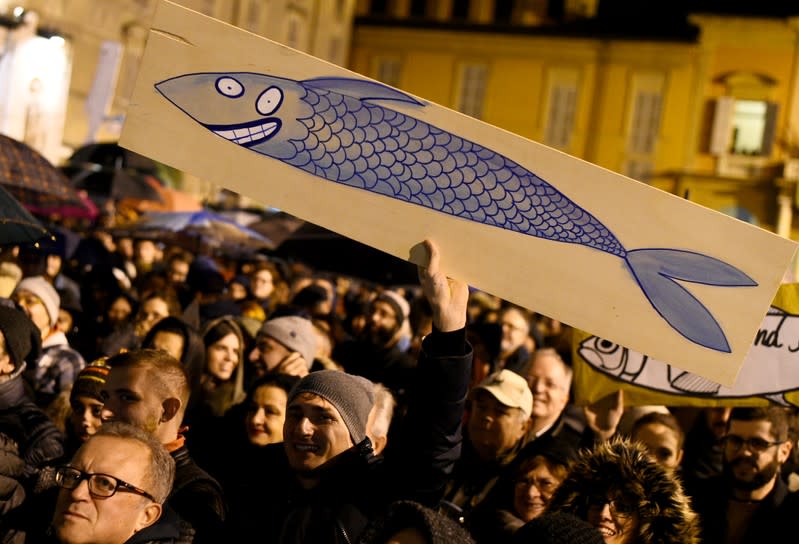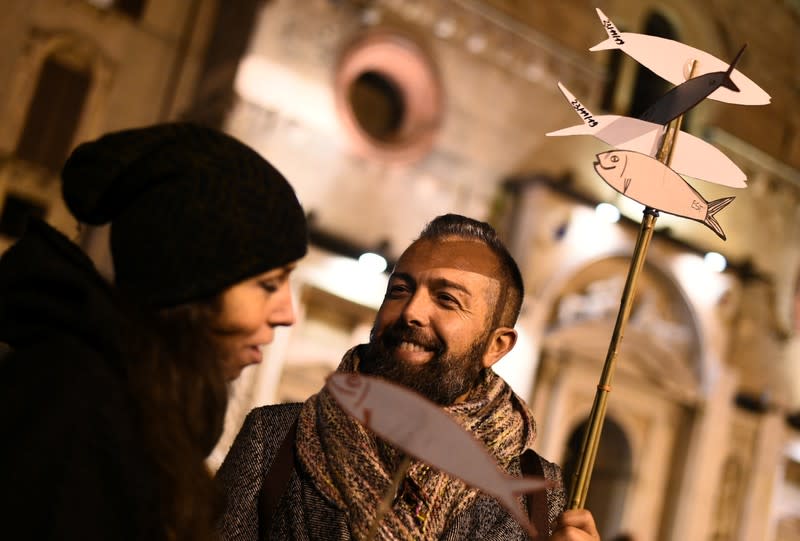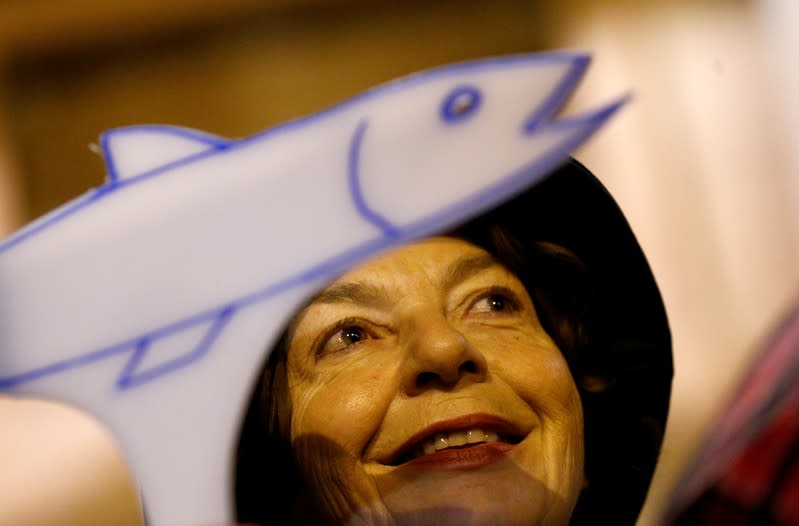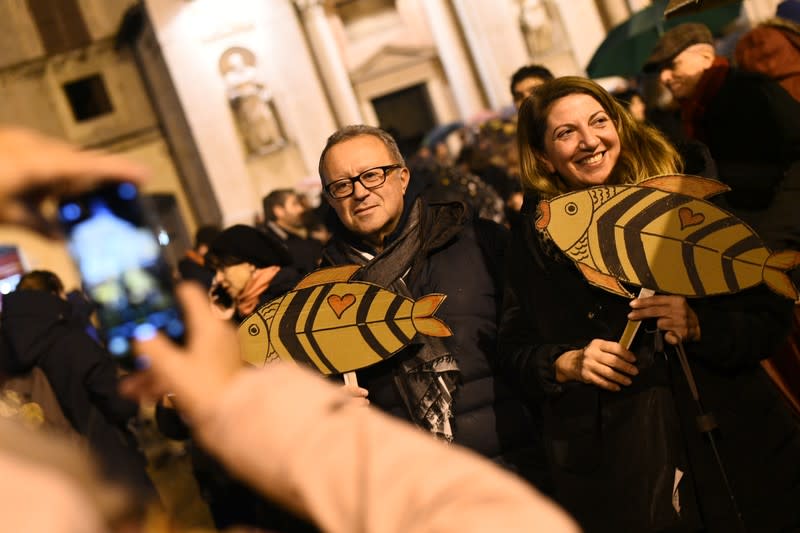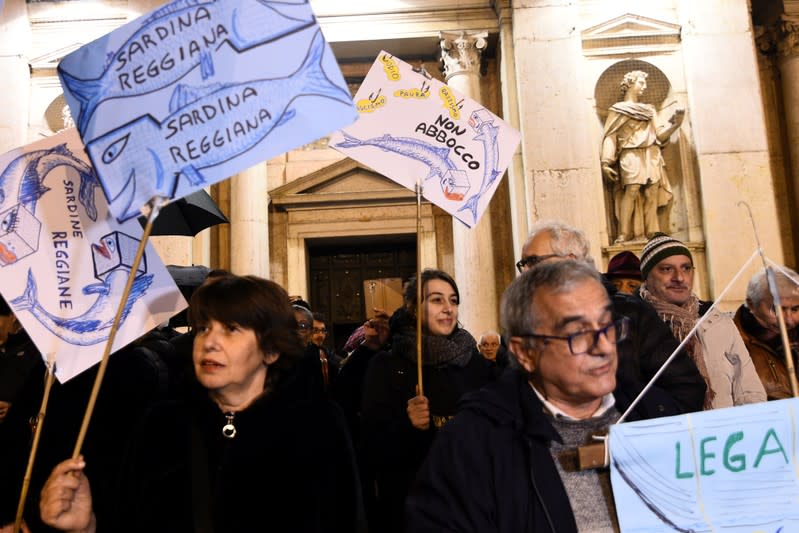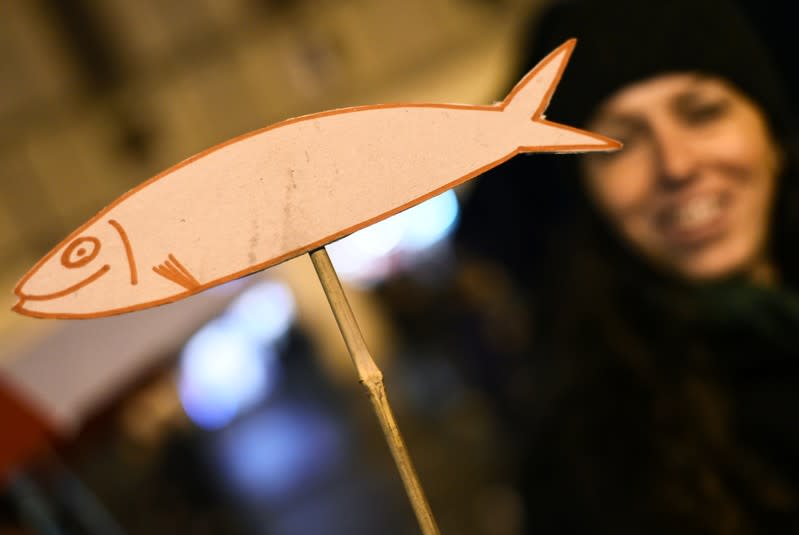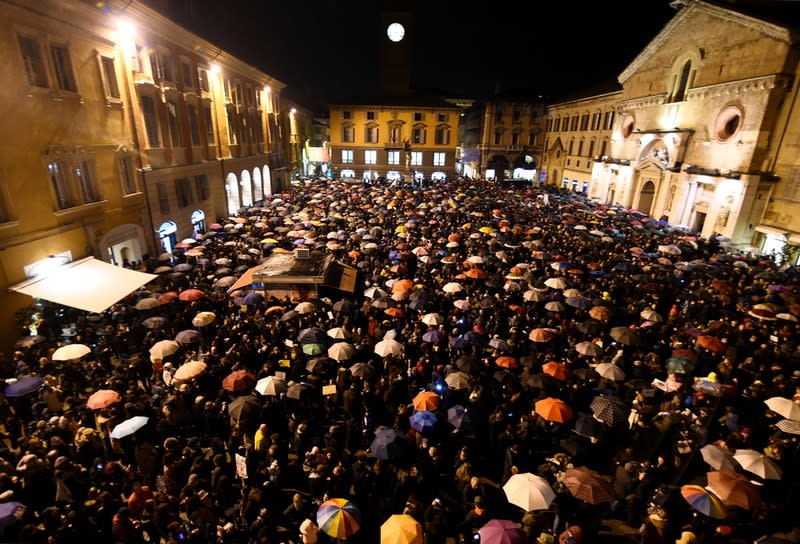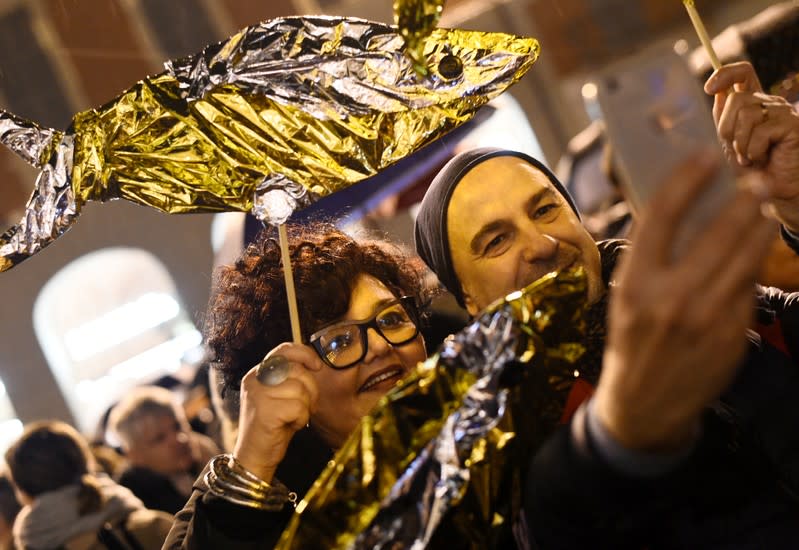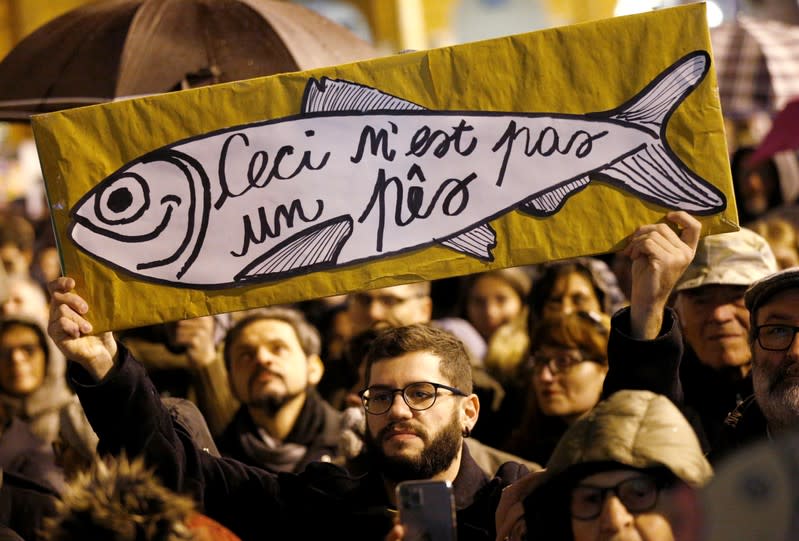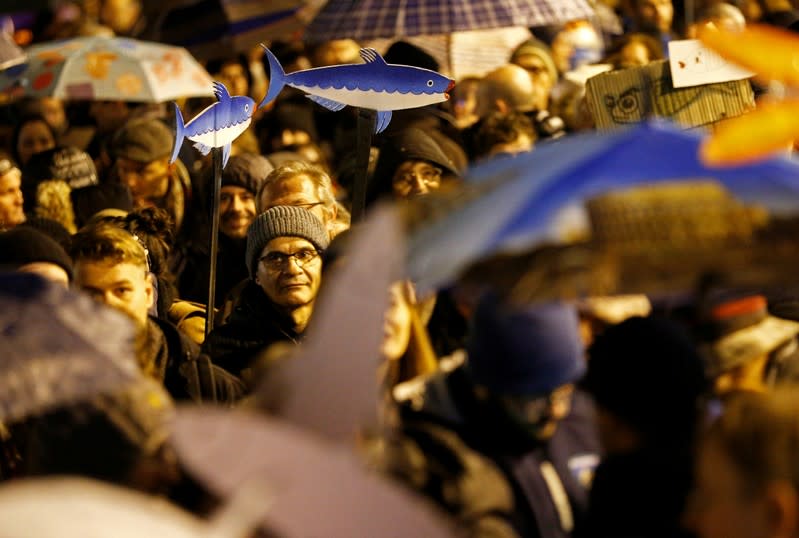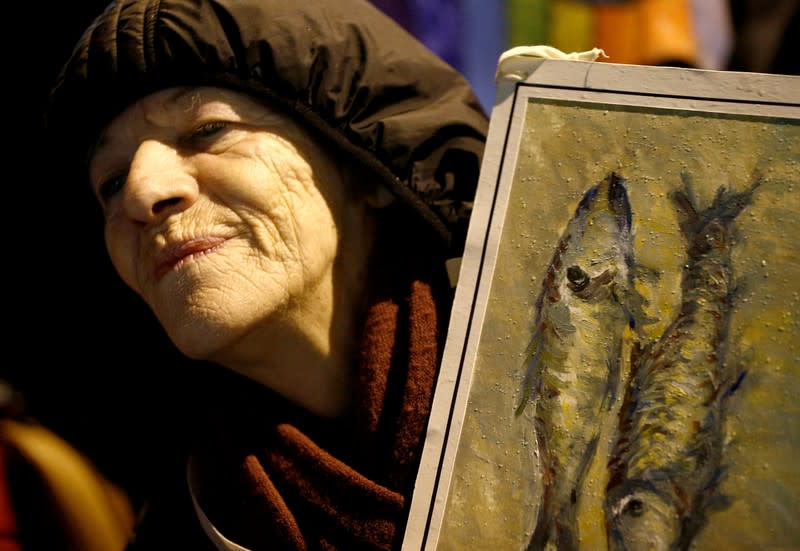A can-do challenge? Italian 'sardines' take on Salvini
By Crispian Balmer
REGGIO EMILIO, Italy (Reuters) - Italy has had many colourful political symbols over the years, including oak trees, olive trees and daisies. Now, a new one has suddenly swum into view and is posing a problem for far-right leader Matteo Salvini.
The humble sardine is the emblem of a nascent movement that is challenging Salvini's League party and looking to halt his seemingly inexorable rise to power - initially in the wealthy northern region of Emilia-Romagna where regional elections are set for January, and then further afield.
"We want to show we can defeat the dragon of populism with ideas, with our brains," said Mattia Santori, 32, one of four young Italians who dreamt up the so-called 6000-Sardines group.
The movement was born this month at a rally in Emilia-Romagna's capital, Bologna. Santori and his friends hoped to draw 6,000 people, but more than double that showed up, packed like proverbial sardines in the main square.
A few days later, some 7,000 people defied driving rain to hold a similar rally in Modena, while on Saturday up to 8,000 people, many brandishing sardine placards, crowded into the elegant centre of Reggio Emilia to stand up to Salvini.
The sardines are not a political party and have no intention of becoming one, but say they want to stir Italians, challenge the League's abrasive, anti-migrant message that dominates social media and try to instil common decency in public debate.
"Finally people have come to their senses and are saying enough is enough," said Gaia Landini, 30, who works in education and attended the Reggio Emilia gathering.
"There is so much hatred out there on social media. The League thrives off creating conflict and we have to stand up and shout ‘No’," she said.
LEFTIST BASTION
Running along the fertile Po River Valley, Emilia-Romagna has been ruled by a succession of leftist parties, starting with the Communists, since World War Two.
It is holding elections on Jan. 26 and Salvini, whose rightist bloc won all five regional ballots that took place in 2019, has promised to "liberate" the left's historic fortress.
Salvini has dragged the League from the edge of extinction to become Italy's largest party in just six years, promoting an uncompromising line on law and order, and promising big tax cuts in defiance of European Union budget rules.
Critics say he promotes hatred with his social media attacks on groups like illegal immigrants, but his message has resonated in a country that has still not recovered from the financial crisis of a decade ago.
Recent Italy-wide opinion polls put him over 30% against around 20% for the next largest party, the centre-left Democratic Party (PD) which governs in Emilia-Romagna and also forged a coalition government at a national level in August with the 5-Star Movement.
But Salvini has not yet worked out a strategy for dealing with the sardines and has held back from holding the sort of daily street rallies in Emilia-Romagna that served him so well in previous regional votes, apparently deterred by the prospect of counter-demonstrations.
"Life is very nice looking at Google all day to work out where I will be and then to come and protest against me. But I have faith we will win in Emilia Romagna," he told reporters last week at a book launch in Rome.
NATIONAL POLITICS
A lot more is at stake in January than just local politics.
If the PD sees its bastion fall, it could decide to quit the national government, viewing defeat as a vote of no-confidence in its argumentative, three-month coalition with 5-Star.
"If the League wins here then it could prove the final straw that brings down the coalition," said Piero Ignazi, professor of comparative politics at Bologna University.
"The left has been dominant in this region for decades and has a long history of good governance. Defeat would be catastrophic for them and suggest Salvini is unstoppable."
In elections to the European Parliament in May, the League won 34% of the vote in Emilia-Romagna, while the PD won 31%. Salvini's allies took an additional 10% between them, meaning they should be in the driving seat in the January ballot.
However, the incumbent PD governor is popular in his region, where unemployment is 4.8%, half the national average, and latest polls give him a slight edge against the right.
Nothing can be taken for granted. Salvini seized another leftist stronghold, Umbria, in October and the PD leadership has struggled to respond to a string of recent ballot-box beatings.
Santori, an economist, said he believed most people were opposed to the League's "Italy First" mantra and just needed bringing together.
"We are like a shoal of sardines. There are far more of us than the sharks," he told Reuters.
Although the movement aims to be inclusive and party banners are not allowed at its rallies, the culture is clearly leftist, with crowds lustily singing the anti-fascist anthem "Bella Ciao" as autumn rains beat down on Reggio Emilia.
Its message has spread rapidly beyond the confines of Emilia-Romagna, and the group's newly minted Facebook page already has a list of 20 upcoming rallies across Italy and as far away as New York over the next three weeks.
"We have to stop Salvini. It doesn't matter if you are red, yellow, white or black. We must end the politics of division," said Stefano Ferrari, 46, holding four, handmade sardines pointing north, south, east and west.
(Reporting by Crispian Balmer; Editing by Frances Kerry)

 Yahoo News
Yahoo News 
